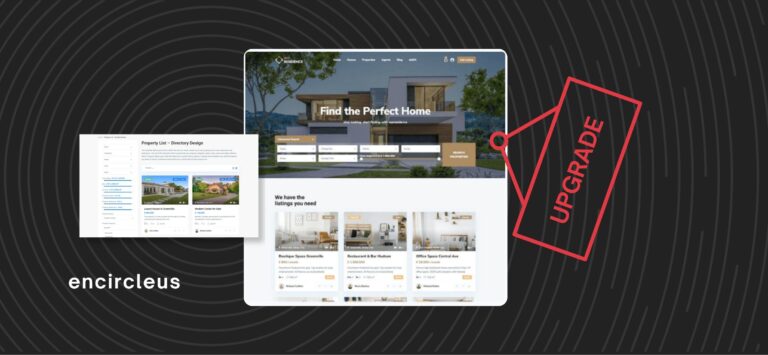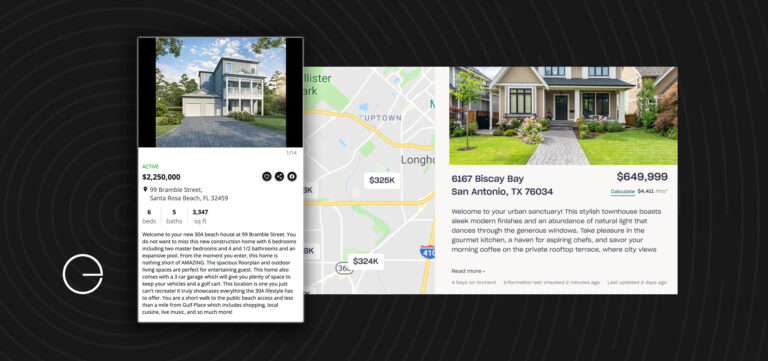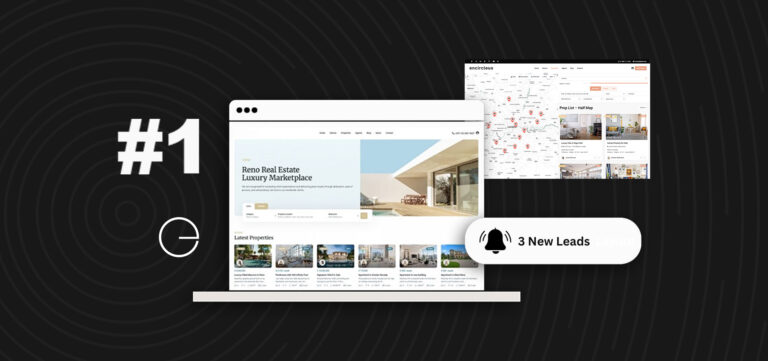In the ever-competitive world of real estate, your website serves as your digital business card. It’s where potential clients discover who you are, what you do, and how you can help them. Whether you’re just starting or looking to elevate your online presence, having a top-tier website is a must.
At Encircleus, we build real estate websites for agents that are elegant and award-winning. In this playbook, we’ll cover everything you need to create a top-notch real estate website. From elevated website design to search engine optimization (SEO), you’ll learn the elements necessary to build a high-performing website that helps you grow your real estate business faster, smarter, and easier.
Why Your Website is Your Best Asset
As a real estate agent, your website is your digital storefront. It plays several crucial roles that directly impact your success:
1. Attracting Targeted Traffic
In today’s digital age, your potential clients are online. A professional website ensures you tap into this vast audience. Research shows that businesses with an online presence can experience growth between 15% and 50%. By ensuring your site is optimized for search engines, you can draw in high-quality leads who are actively searching for real estate services.
2. Lead Generation and Conversion
Your website can be a powerful lead magnet when used correctly. Think of it as your personal real estate resource center. By addressing common client questions and offering helpful content, you’ll build trust with your audience. This can lead to higher-quality inquiries and conversions. Adding clear calls-to-action (CTAs) such as “Schedule a Consultation” or “View Listings” encourages visitors to take the next step toward becoming clients.
3. Educational Platform
As a real estate agent, you’re often the primary resource for clients seeking guidance on buying or selling homes. By offering educational content on your site—such as blog posts, market insights, and home-buying tips—you position yourself as an expert. This not only builds credibility but also strengthens relationships with clients who will trust you when it’s time to make decisions.
4. 24/7 Communication Channel
Your website is always “open for business.” By integrating features like live chat, contact forms, and social media links, you can communicate with potential clients at any time. These tools allow for instant engagement, ensuring you’re always accessible to answer questions or provide more information.
5. Simplifying Analytics and Tracking
A website isn’t just a place to display listings—it’s also a data-rich resource. By integrating tools like Google Analytics, you can track how visitors interact with your site, which pages they spend the most time on, and what actions they take. This data will help you refine your marketing strategies and adjust your website for maximum lead conversion.
6. Credibility and Trust
Having a professional website immediately boosts your credibility as a real estate agent. You can showcase testimonials, client reviews, case studies, and your portfolio, all of which work together to build trust. A website with these elements reassures clients that they’re dealing with a seasoned professional.
Key Elements of a High-Performing Real Estate Website for Solo Agents
Now that you understand the importance of a website, let’s explore the essential features that make a real estate website stand out.
1. Web Design: Clean, Professional, and Mobile-Optimized
Your website’s design should be aesthetically pleasing, easy to navigate, and mobile-friendly. With the increasing number of consumers browsing on mobile devices, ensuring your site is responsive is key to offering a seamless experience. A clean design allows your listings and services to shine without distractions.
2. User Interface (UI)/User Experience (UX)
UI and UX design are crucial to creating an enjoyable browsing experience for your visitors. The UI refers to the visual design elements, like buttons and menus, while UX is about how easy and intuitive your site is to navigate. Simple, well-organized pages encourage users to stay longer and explore more of your offerings.
3. Effective Website Copy
The content on your website should not only describe your services but also convert visitors into clients. Strong, clear website copy will highlight your expertise, show potential clients how you can meet their needs, and create a sense of urgency or excitement to act now. Make sure each page has clear CTAs guiding visitors toward the next step in the client journey.
4. SEO: Getting Found by the Right People
Search engine optimization (SEO) ensures your website ranks high in search results when clients are looking for real estate services. Effective SEO includes optimizing keywords, having fast loading times, using high-quality images, and ensuring proper use of meta tags and descriptions. When done right, SEO helps drive organic traffic, leading to more leads and conversions.
5. Social Media Integration
Social media is an essential part of any modern real estate business. By integrating your social media channels into your website, you allow visitors to engage with you across platforms. It also helps in sharing real-time updates, new listings, and behind-the-scenes content that humanizes your brand.
6. IDX Integration
IDX integration allows you to display MLS listings directly on your website. This functionality ensures that visitors can view up-to-date properties, search for homes based on their criteria, and seamlessly browse listings without having to leave your site. It’s a vital tool for attracting leads and engaging clients with your available properties.
Building Your Real Estate Website
With the right design, content, and technical features in place, your website will become your most powerful business asset. Whether you’re looking to build from scratch or revamp your existing site, here are some key steps:
- Define Your Brand: Your website should reflect your unique selling proposition and personality. Think about what sets you apart as a solo agent and ensure your website conveys that message clearly.
- Choose a Platform: There are several website platforms available for real estate agents, such as WordPress or specialized real estate platforms. Choose the one that suits your needs, whether you’re looking for simplicity or more advanced customization.
- Create Compelling Content: Provide your audience with valuable information that resonates with their needs. This can include market reports, client success stories, property guides, and more.
- Leverage Analytics: Use analytics tools to track your website’s performance, including visitor behavior, popular pages, and conversion rates. This will help you continuously improve your site and marketing strategy.
Conclusion
Your website is the foundation of your real estate business. By focusing on key elements like professional design, strong SEO, and lead-generating features, you can create a website that not only attracts visitors but converts them into loyal clients. Whether you’re just starting or looking to upgrade, the right tools and strategies will make your website a powerful engine for growing your real estate business.
Need help building your perfect website? At Encircleus, we specialize in creating custom websites that are tailored to meet the unique needs of real estate agents in Israel. Let us help you design a website that reflects your brand, attracts clients, and drives business success.
Reach out today, and let’s start building the perfect website for your real estate business!



